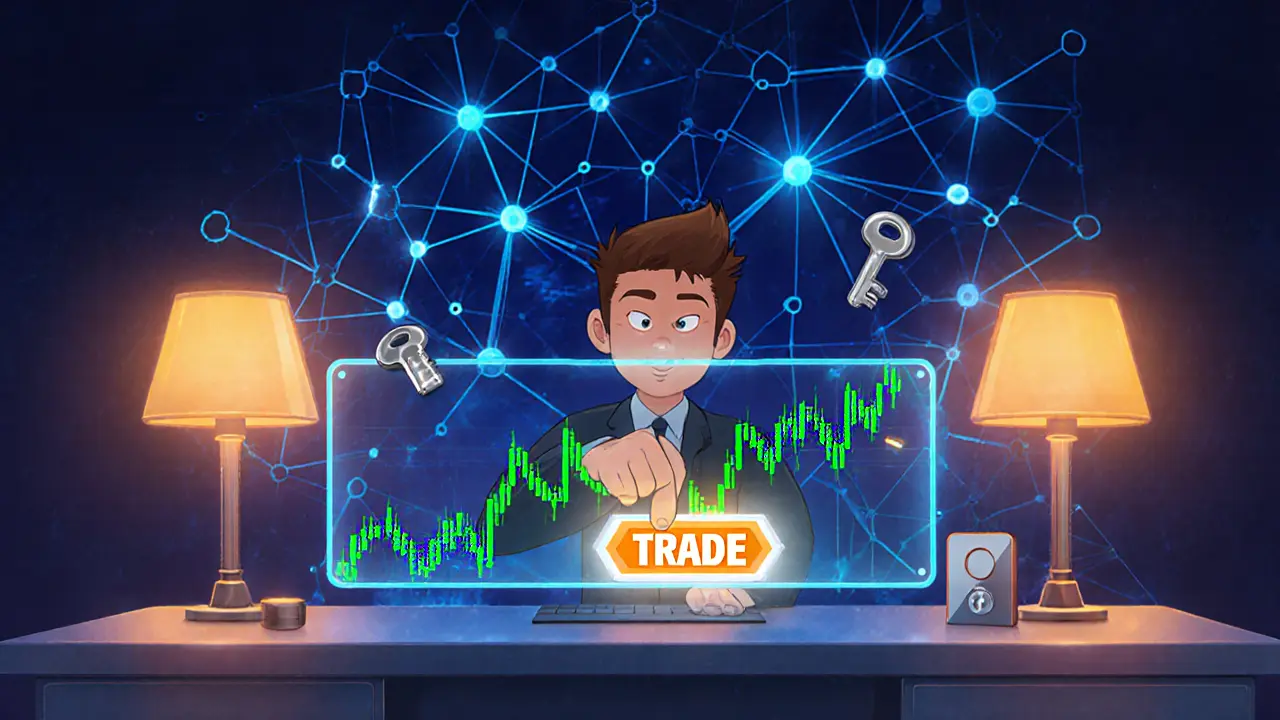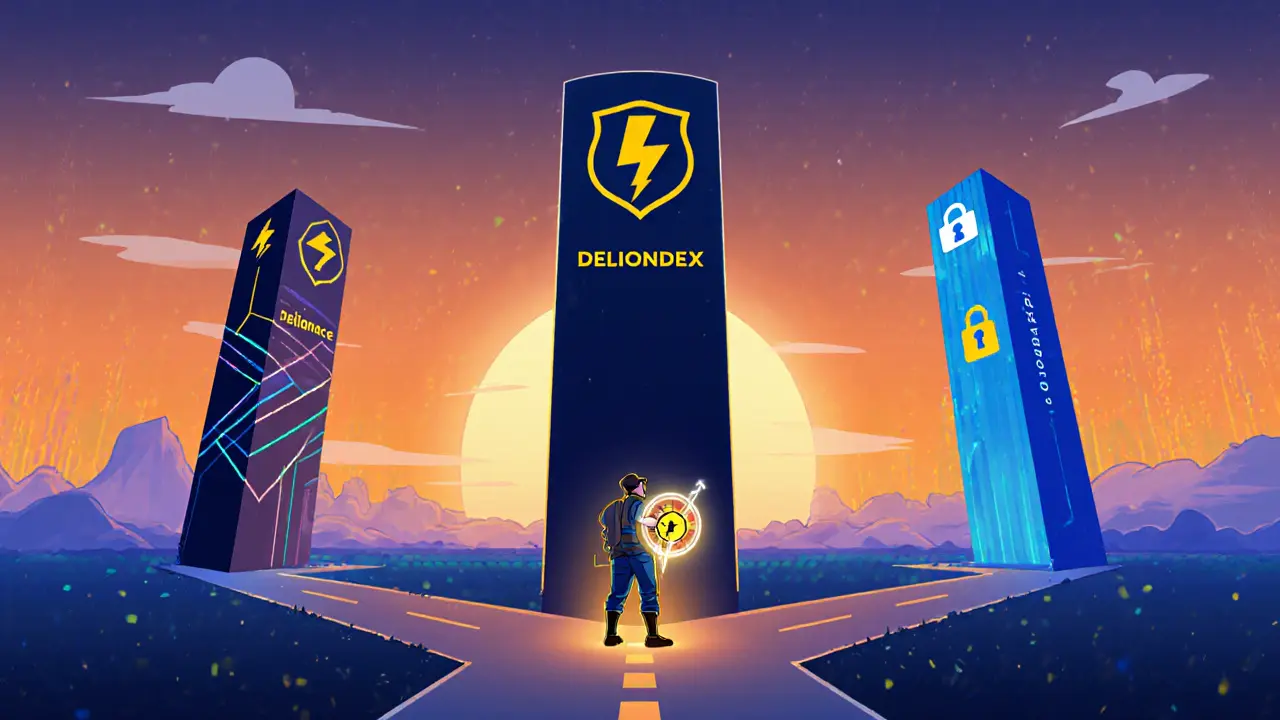 Oct, 19 2025
Oct, 19 2025
Deliondex Trading Fee Calculator
Trade Input
Fee Analysis
Estimated Fees
Pro Tip: At $1M monthly volume, maker fees drop to 0.08% and taker fees to 0.10%.
Fee Breakdown
| Volume Tier | Maker Fee | Taker Fee |
|---|---|---|
| $0-$999,999 | 0.12% | 0.16% |
| $1,000,000+ | 0.08% Discount | 0.10% Discount |
Key Takeaways
- Deliondex targets experienced traders with a hybrid design that mixes centralized speed and decentralized asset custody.
- Spot trading fees start at 0.12% for makers and 0.16% for takers, with volume‑based discounts.
- Security relies on multi‑signature hot wallets, hardware‑backed cold storage, and optional biometric login.
- Liquidity is decent for major pairs but lags behind Binance and Coinbase on niche altcoins.
- Customer support is 24/7 live chat, but response times can stretch during high‑volatility events.
What is Deliondex?
When you hear the name Deliondex is a crypto exchange that blends a centralized order‑book with decentralized asset custody, the first question is usually “how is it different from the giants?” In short, Deliondex runs a traditional matching engine for speed while keeping users' tokens in non‑custodial wallets that you control. Launched in early 2022, the platform markets itself as a “best‑of‑both‑worlds” solution for traders who want fast execution without handing over private keys.
How to Get Started
- Visit the official website and click the “Sign Up” button.
- Complete the KYC flow - upload a government ID, a selfie, and verify your email.
- Enable two‑factor authentication (2FA) via an authenticator app.
- Link a bank account or a fiat on‑ramp to fund your account, or deposit crypto directly to the generated wallet address.
- Once the deposit shows up, navigate to the “Trade” tab and pick a market.
Deliondex also offers a mobile app for iOS and Android, so you can monitor positions on the go. The app mirrors the web UI, and it stores your private keys encrypted on the device.

Fees and Trading Costs
Understanding fees is crucial because they eat into profits, especially for high‑frequency traders. Deliondex uses a maker‑taker model:
- Maker fee: 0.12% (reduced to 0.08% after $1 M 30‑day volume).
- Taker fee: 0.16% (reduced to 0.10% after $1 M 30‑day volume).
- Deposits via bank transfer are free; crypto deposits incur a network‑level fee that varies by blockchain.
- Withdrawals cost a flat fee plus the on‑chain gas cost (e.g., 0.0005 BTC or 0.01 ETH).
Compared with Binance, which charges as low as 0.02% for makers, Deliondex sits in the mid‑range. However, the added security of non‑custodial custody can justify the premium for risk‑averse traders.
Security and Compliance
Security is where Deliondex tries to outshine the crowd. The platform employs:
- Multi‑signature hot wallets that require approval from two out of three keys for any outgoing transaction.
- Cold storage that holds roughly 95% of user assets in air‑gapped hardware security modules (HSMs).
- Optional biometric login (fingerprint or facial recognition) on the mobile app.
- Real‑time monitoring for suspicious activity, with automatic withdrawal freezes if AML thresholds are crossed.
On the compliance side, Deliondex follows the “Travel Rule” and partners with a global KYC provider. It is registered with the Financial Conduct Authority (FCA) in the UK and has a Money Services Business (MSB) license in New Zealand, which aligns with the author’s location.
Feature Set Compared to Major Players
| Feature | Deliondex | Binance | Coinbase | Kraken |
|---|---|---|---|---|
| Custody model | Non‑custodial (user‑controlled keys) | Custodial | Custodial | Custodial |
| Maker fee (base) | 0.12% | 0.02% | 0.00% (high‑volume) | 0.16% |
| Taker fee (base) | 0.16% | 0.04% | 0.30% | 0.26% |
| Number of spot pairs | ≈ 350 | ≈ 1,800 | ≈ 560 | ≈ 700 |
| Mobile app | Android & iOS | Android & iOS | Android & iOS | Android & iOS |
| Customer support | 24/7 live chat, email | 24/7 live chat, phone | Email & phone (limited hours) | Live chat, ticket system |
| Regulatory licences | FCA, NZ MSB | Cyprus, Malta, USA (limited) | USA, EU, UK | USA, EU, Japan |
The table shows that Deliondex’s biggest advantage is custody control, while its fee structure is higher than Binance but lower than Coinbase for most retail traders. Liquidity depth is solid for BTC, ETH, and USDT, but you’ll notice slippage on low‑volume altcoins.

Pros and Cons
- Pros
- Non‑custodial design gives users full ownership of private keys.
- Decent fee discounts after reaching $1 M monthly volume.
- Robust security: multi‑sig hot wallets, hardware‑backed cold storage.
- Transparent roadmap with plans for margin trading and DeFi integrations.
- Cons
- Liquidity can be thin on niche pairs compared with Binance.
- Higher base fees may turn away price‑sensitive day traders.
- Customer support, while 24/7, sometimes lags during market spikes.
- Limited fiat on‑ramps outside of Europe and Oceania.
Final Verdict
If you value having control over your private keys while still enjoying fast order matching, Deliondex is worth a look. The platform isn’t the cheapest, but the security trade‑off can be meaningful for traders who have already built a sizable portfolio. For beginners, Coinbase remains the friendliest gateway, and for low‑fee, high‑liquidity power users, Binance still holds the crown. Deliondex sits comfortably in the middle - a solid option for intermediate traders who demand security without sacrificing speed.
Frequently Asked Questions
Is Deliondex regulated?
Yes. Deliondex holds an FCA registration in the UK and a Money Services Business licence in New Zealand, and it complies with the global Travel Rule for crypto transfers.
Can I withdraw my funds to a hardware wallet?
Absolutely. Because assets are stored non‑custodially, you can push any balance to an external hardware wallet (Ledger, Trezor, etc.) at any time.
What trading pairs are available?
Deliondex lists roughly 350 spot pairs, covering the major cryptocurrencies (BTC, ETH, BNB, USDT) plus a curated set of mid‑cap altcoins.
Does Deliondex support margin or futures?
Margin trading is on the roadmap for Q2 2026, and futures products are slated for Q4 2026. As of October 2025, only spot trading is live.
How does the DEX component work?
Behind the scenes Deliondex runs a smart‑contract bridge on Ethereum and Binance Smart Chain. When you place a trade, the order is matched centrally, but settlement occurs on‑chain, so you retain control of the private key that signs the transfer.
Erik Shear
October 19, 2025 AT 08:56Fees are high but security’s decent.
Joy Garcia
October 21, 2025 AT 00:40Can you believe they dare to market a “best‑of‑both‑worlds” exchange while secretly keeping a foot in the centralized swamp? Every time I log in I feel eyes watching my private keys, like some unseen cabal pulling strings behind the scenes. The fees might look modest, but they’re a tax on the very freedom they claim to protect. If you value true decentralization, you should be questioning whether a hybrid model ever truly gives you control. It’s a seductive promise that could mask a bigger surveillance net.
Tom Glynn
October 22, 2025 AT 18:20Honestly, the non‑custodial design is a breath of fresh air for people who’ve been burned by custodial hacks 😊. It gives you ownership while still letting the engine match orders at lightning speed. Think of it as a bridge between DeFi freedom and traditional liquidity. If you’re a yoyo‑trader, the volume‑based discounts could make the fee spread more tolerable. Keep an eye on their roadmap; the upcoming margin feature might tip the scales in your favor.
mike ballard
October 24, 2025 AT 12:00Deliondex’s architecture essentially implements a hybrid order‑book coupled with an off‑chain settlement layer, leveraging EVM compatibility for on‑chain finality 🚀. The multi‑sig hot wallet paradigm reduces single‑point‑of‑failure risk while maintaining high throughput. Their API docs even expose RESTful endpoints for market data aggregation, which is a boon for algo‑trading rigs. However, the order‑book depth on niche altcoins remains a liquidity choke point. Overall, it’s a solid middle‑ground solution for fintech integrators.
Andrew Smith
October 26, 2025 AT 04:40I think it’s a great option for traders who want security without sacrificing speed. The fee schedule is transparent and the volume discounts are generous enough to keep day‑traders happy. Plus, the 24/7 live chat shows they care about user experience. If you’re looking for a platform that balances custody and performance, give Deliondex a try. You might find it fits nicely between the extremes of Binance and Coinbase.
Ty Hoffer Houston
October 27, 2025 AT 22:20From a user‑experience standpoint, the interface feels clean and intuitive, especially on the mobile app. Storing your private keys locally, encrypted on the device, gives peace of mind without a steep learning curve. The biometric login adds a nice touch for quick access. While the fiat on‑ramps could be broader, the existing options cover most major regions. Overall, it’s a welcoming platform for anyone stepping up from basic exchanges.
Jireh Edemeka
October 29, 2025 AT 16:00Oh sure, because what the crypto world really needed was another “hybrid” that pretends to be revolutionary while borrowing the exact same liquidity problems as the big guys. Their support team answering tickets during a market crash is just… adorable. And those “transparent” fees? Absolutely crystal‑clear once you’ve dissected the fine print. If you enjoy paying a premium for the illusion of control, you’re in the right place.
Molly van der Schee
October 31, 2025 AT 09:40I completely understand the hesitation about higher fees, especially if you’re just starting out. The security features, like multi‑signature wallets and hardware‑backed cold storage, can actually save you from catastrophic losses later on. It’s a trade‑off that many find worthwhile once they’ve built a modest portfolio. Take your time to test the platform with small amounts before committing larger funds. You’ll get a better feel for the liquidity and support quality.
Mike Cristobal
November 2, 2025 AT 03:20We have a responsibility to demand platforms that prioritize user sovereignty over profit margins 🛡️. Deliondex’s non‑custodial approach aligns with the ethical principles of true decentralization. If an exchange hides fees or compromises on security, it betrays the trust of its community. Choose services that respect your financial autonomy and hold them accountable. The future of crypto depends on these moral choices.
Paul Barnes
November 3, 2025 AT 07:06While the hype around hybrid models is loud, the actual on‑chain settlement still inherits central points of failure. The “best‑of‑both‑worlds” claim often masks a compromise that pleases no purist.
Tom Grimes
November 5, 2025 AT 00:46Let me unpack that a bit, because the reality is far messier than the binary you’ve drawn. First, the hybrid model does not magically eliminate centralization; it merely shifts it from a single custodial vault to a set of coordinated validators that still require trust. The multi‑signature hot wallets, while an improvement over a single key, introduce coordination complexity that can become a bottleneck during peak volatility. When you say “no purist,” you ignore the fact that many traders are pragmatic and care more about execution speed than ideological purity. The on‑chain settlement you mention is still subject to network congestion, gas price spikes, and potential smart‑contract bugs, which can freeze assets temporarily. Moreover, the custodial layer that handles order matching remains a single point of operational risk-if the matching engine goes down, trading stops for everyone, regardless of how secure your keys are. You also have to consider the regulatory pressure that forces exchanges like Deliondex to implement KYC and AML checks, which erodes the anonymity that some users seek. This isn’t a conspiracy; it’s a legal reality. The claim that hybrid designs “mask” anything is a stretch; they’re simply a compromise between speed and control, and that compromise has its own set of trade‑offs. Users who think they’re getting the best of both worlds often end up paying for both sets of drawbacks: higher fees than pure DEXs and less liquidity than pure CEXs. The “premium” you pay for security is not just a fee; it’s an investment in peace of mind against hacks that have crippled many fully custodial platforms. If you look at the historical breach data, the non‑custodial approach does reduce the blast radius, but it does not eliminate human error in key management. Finally, the idea that any platform can be purely “decentralized” is a myth perpetuated by marketing departments; every system has governance, and every governance model requires some form of central authority, even if it’s a council of token holders. So before dismissing the hybrid as a mere compromise, consider whether the combination of features actually serves the diverse needs of today’s traders, or if it simply creates a new middle ground that satisfies no one fully.